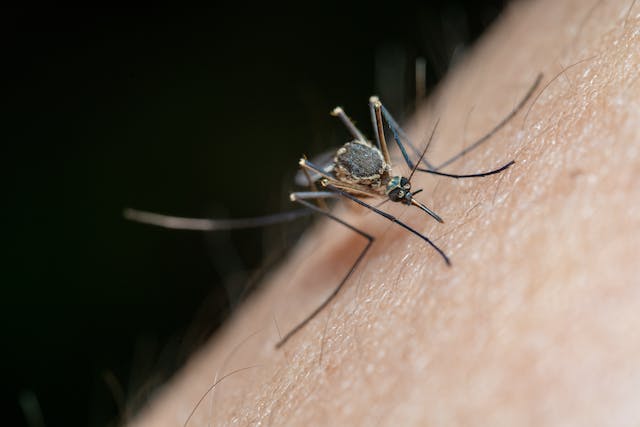
As winter descends upon Raleigh, North Carolina, residents experience relief from the buzzing nuisances of mosquitoes. The cold weather signals a hiatus for these pesky insects as they seemingly disappear for the season.
But do mosquitoes truly vanish during the winter months, or do they find ways to endure the cold temperatures? In this exploration, we uncover the mysteries surrounding mosquitoes in the winter, shedding light on their survival tactics and shedding misconceptions about their disappearance.
Mosquitoes in the Winter: Survival Strategies
Contrary to popular belief, mosquitoes don’t entirely disappear during Raleigh’s winter. Instead, they adopt survival strategies to endure the cold. Here’s a glimpse into how these resilient insects manage during the colder months:
1. Hibernation: Some mosquito species enter a hibernation-like state when temperatures drop. They seek shelter in protected areas, such as hollow logs, animal burrows, or basements, where they remain dormant until temperatures rise.
2. Diapause: Other species undergo diapause, a state of suspended development, during winter. In this phase, eggs, larvae, or pupae halt their growth and remain inactive until conditions become favorable.
3. Cold Resistance: Certain types of mosquitoes in the winter can survive due to adaptations. These mosquitoes produce chemicals that act as antifreeze, preventing ice crystal formation within their bodies.
While mosquitoes may not buzz around in the biting frenzy of summer, they adopt ingenious mechanisms to weather the winter months in Raleigh. However, their activity significantly decreases, providing a reprieve for residents.
Mosquitoes in the Winter: Can They Survive?
But don’t be fooled. The arrival of winter in Raleigh does have a significant impact on mosquito populations. As temperatures drop, the lifecycle of mosquitoes slows down or halts altogether. The cold weather limits their ability to breed and develop, resulting in a decrease in their numbers.
Firstly, the freezing temperatures inhibit the breeding cycle of mosquitoes. Standing water, their preferred breeding grounds, freezes over, disrupting the hatching of eggs and the development of larvae and pupae. This natural control mechanism helps reduce the emergence of new adult mosquitoes during the winter months.
Secondly, mosquitoes’ reduced activity and metabolic rate in colder temperatures contribute to a slowdown in their life processes. The shortened days and cooler temperatures decrease their energy levels and mobility, limiting their foraging for blood meals and reproductive activities.
However, while winter diminishes mosquito activity significantly, it doesn’t completely eradicate them. Some resilient species and individuals may survive in protected environments or microclimates, awaiting warmer conditions to resume their lifecycle.
Mosquito Control Strategies for Winter
Although mosquitoes in the winter aren’t a huge concern in Raleigh, it’s prudent to employ preventive measures to manage potential resurgence in the following warmer seasons:
1. Eliminate Standing Water: Even in winter, removing any standing water around your property is a good idea. Mosquitoes can lay eggs in even the smallest water reservoirs. Ensure gutters are clear, flower pots are drained, and containers are emptied to prevent breeding opportunities.
2. Maintain Landscape: Regularly maintain your outdoor spaces by trimming vegetation, cutting tall grass, and reducing areas where mosquitoes can rest during the colder months.
3. Seek Professional Assistance: Consider seeking advice from pest control experts like Innovative Pest Solutions in Raleigh. We can provide tailored guidance and treatments to reduce mosquito populations and prevent infestations as temperatures rise.
By staying vigilant and implementing proactive measures, Raleigh residents can minimize mosquito populations during winter and mitigate the risk of increased activity when warmer weather returns.
Preparing for Mosquito Season: Winter Maintenance
While winter might offer a brief respite from mosquitoes in Raleigh, it’s an opportune time to prepare for the upcoming warmer months when these pests become more active again.

Here are essential winter maintenance steps to curb mosquito populations and ensure a more mosquito-free environment:
1. Inspect and Repair: Conduct a thorough inspection of your property, focusing on areas prone to water accumulation or potential shelters for mosquitoes. Repair any leaky pipes, fix broken window screens, and seal gaps in doors and windows to prevent mosquitoes from entering your home.
2. Consider Professional Treatments: Engage pest control services like Innovative Pest Solutions to assess your property’s mosquito vulnerability. Professionals can provide tailored solutions and treatments, such as larvicide applications or residual sprays, targeting potential breeding sites.
3. Plan for Spring and Summer: Use the winter months to plan ahead. Consider landscaping modifications to reduce areas where water can collect, strategically plant mosquito-repelling plants, and explore long-term mosquito control options with pest control experts.
In Raleigh, North Carolina, the winter season brings a temporary respite from mosquito activity. Although these pests don’t vanish completely, they employ survival tactics to endure the cold, resulting in diminished activity and reduced populations.
Awareness of their behavior during winter enables residents to prepare themselves, anticipate potential infestations, and strategize for effective mosquito control methods as the warmer weather approaches.
Remember, proactive steps such as eliminating standing water and seeking professional guidance from pest control services like Innovative Pest Solutions are crucial in managing mosquito populations throughout the year in Raleigh. Contact us today!





